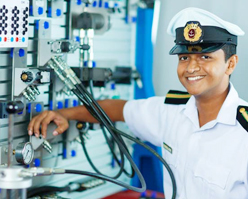Smooth Glide: Prioritizing Safety with Emergency Preparedness in Merchant Navy Training
Body
Setting sail on the open seas is an exhilarating adventure, but it's not without its risks. For those pursuing a career in the Merchant Navy, safety is paramount. That's why emergency preparedness is a cornerstone of Merchant Navy training. From mastering life-saving techniques to honing crisis management skills, aspiring seafarers undergo rigorous training to ensure they're ready to navigate any storm that may arise.
- Understanding the Importance of Emergency Preparedness
In the unpredictable environment of the ocean, emergencies can arise at any moment. Whether it's a medical emergency, a fire on board, or a navigational hazard, being prepared to respond swiftly and effectively is critical to ensuring the safety of everyone on board. That's why emergency preparedness is ingrained in every aspect of Merchant Navy training.

- Learning the Ropes: Essential Training for Emergency Situations
Merchant Navy training programs include comprehensive coursework and hands-on drills focused on emergency preparedness. Cadets learn essential skills such as first aid, firefighting techniques, and survival at sea. They practice donning firefighting gear, deploying life rafts, and executing emergency evacuation procedures until they can perform them flawlessly, even under pressure.
- Simulating Real-World Scenarios: Practical Drills and Exercises
Theory is essential, but nothing beats hands-on experience when it comes to emergency preparedness. That's why training ships are equipped with state-of-the-art simulation facilities where cadets can immerse themselves in realistic scenarios without putting lives at risk. From simulated engine room fires to man-overboard drills, these exercises give cadets the opportunity to put their training into action and develop the confidence they need to respond effectively in a crisis.
- Staying Cool Under Pressure: Crisis Management Skills
In addition to mastering technical skills, Merchant Navy cadets are taught the importance of remaining calm and composed in high-stress situations. They learn how to assess risks, make quick decisions, and communicate effectively with their crewmates and superiors. By cultivating a culture of teamwork and leadership, Merchant Navy courses instills cadets with the confidence and resilience needed to navigate even the most challenging emergencies.
- Continual Improvement: Evolving Safety Protocols
The maritime industry is constantly evolving, and so too are safety protocols and procedures. That's why emergency preparedness is an ongoing focus throughout a seafarer's career. Merchant Navy officers undergo regular refresher training to stay up-to-date on the latest safety regulations and best practices.

- Safety at Sea: A Shared Responsibility
Ultimately, safety at sea is a collective responsibility. From the most experienced captain to the newest cadet, every member of a ship's crew plays a vital role in ensuring the safety and well-being of everyone on board. By prioritizing emergency preparedness in Merchant Navy training, aspiring seafarers are equipped with the knowledge, skills, and mindset needed to keep themselves and their fellow crew members safe as they embark on their maritime careers.
Conclusion
In the Merchant Navy, safety always comes first. Through comprehensive training and hands-on experience, cadets learn the importance of emergency preparedness and develop the skills they need to respond effectively to any situation they may encounter at sea.











Comments